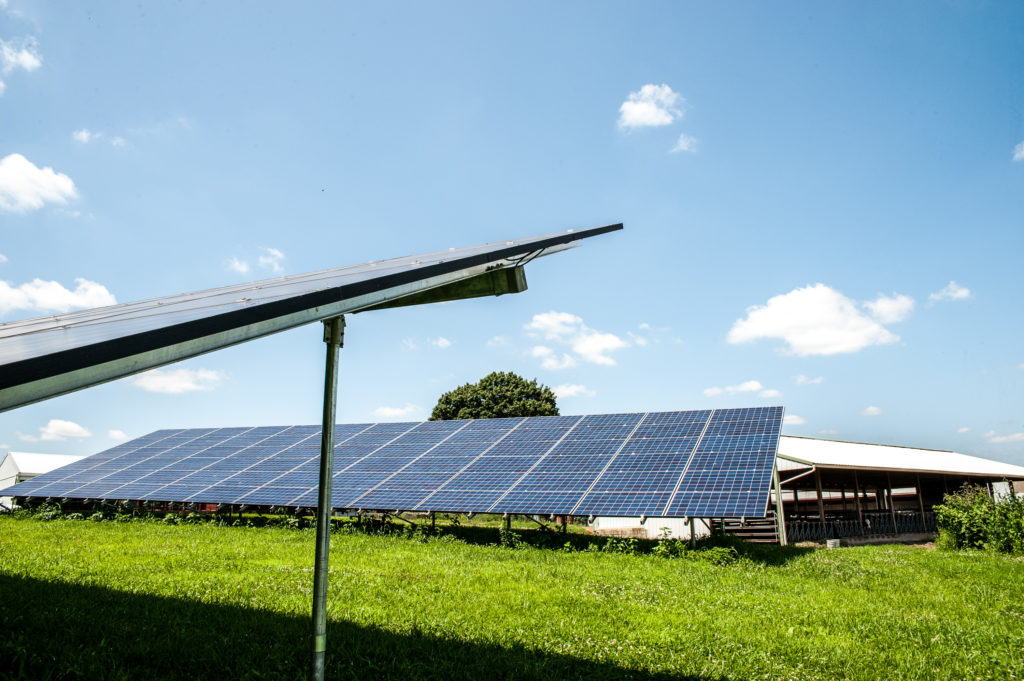In the last few months, I have heard from several Texas landowners who have been contacted by solar companies seeking to lease agricultural land for solar projects. There is surprisingly little information available for landowners considering the pros and cons of entering into a solar lease agreement. This article outlines some of the key considerations for landowners considering and/or negotiating a solar lease.
As always, I highly recommend that landowners consult an experienced attorney to review any lease agreement before it is signed. As Stamford, Texas attorney James Decker explains, “We’re still early in the era of solar energy development in West Texas. Lease rates appear very enticing, particularly in an area of low commodity prices, but landowners should seek advice from straightforward, practical-minded legal counsel to minimize unintended consequences and avoid a deal that’s ‘too good to be true.’”
To which estate does the sun belong?
Interestingly, the Texas Supreme Court has never ruled on whether the sun is part of the surface or mineral estate. Most (maybe all…) legal scholars assume that the Court would hold that solar rights belong to the surface owner, making that person the one who has the right to enter into and negotiate solar lease agreements. Of course, this can be modified by agreement between the parties. For example, assume that Adam owns both the surface and mineral rights of a piece of land. Adam enters into an agreement to sell the land to Beth, but he reserves solar leasing rights. If that happened, even though Beth would own the surface of the land, Adam, rather than Beth, would own the solar rights.
The fact that solar is likely part of the surface estate is important from a legal standpoint with regard to implied rights. As between surface and mineral estates, the mineral estate is dominant under Texas law. That means that a mineral owner has the right to use as much of the surface as is reasonably necessary to produce minerals, without permission from or payment to the surface owner. The same is not true for other surface substances. Because one surface substance is not dominant over others, the implied right of use does not exist. For example, assume an oil company lease oil rights to a piece of property. Because oil rights are part of the mineral estate, the oil company would have the implied right to use the surface to produce the minerals, even if the lease was silent on this issue. If, however, a solar company leased solar rights, all of their rights would need to be set forth in the lease agreement because no implied rights would exist since solar is not part of the mineral estate.
This issue raises a host of other questions including whether the accommodation doctrine might protect an existing solar project and how the duty owed by an executive rights holder to a non-participating royalty owner could be impacted. It is important to seek to avoid these issues and draft lease provisions to protect the landowner as much as possible.
Rights of mineral owners.
An important consideration for both landowners and solar companies is the status of the mineral estate beneath the land being considered for a solar project. As discussed above, because the mineral estate is dominant in Texas, the mineral owner has the right to use as much of the surface estate as is reasonably necessary to produce oil and gas. This includes building drill pads, preparing roads, installing pipelines, and drilling injection wells. Not surprisingly, this poses a major concern for solar lessees looking to put in a solar facility on the same land. Solar companies will likely carefully analyze the status of the mineral estate including how many ownership interests exist in the estate and whether a lease agreement is currently in place. Landowners should take care not to agree to serve as a type of “middle man” or negotiator between solar and mineral lessees, particularly if they have no relationship with the mineral owners.
Solar leases are usually not short in duration.
According to a Texas attorney who frequently represents solar companies in lease agreement negotiations, these lease agreements typically last between 20-30 years. These leases tie up property for a significant period of time, so it is important to carefully evaluate the lease terms. Typically, there are two phases to a solar lease: development/construction and operations. The development period involves testing to see if the project will likely work, conducting environmental studies, analyzing transmission capabilities, and other information gathering. The operations phase, on the other hand, occurs when the project actually begins producing and selling energy. When reviewing draft leases, one should pay careful attention to how these phases are defined and what is required to occur to move from the development to the operations phase.
Royalties are not common in solar leases.
Unlike oil and gas lease agreements, it is uncommon for a solar lease agreement to set forth a royalty as the payment method. Instead, annual payment terms are usually defined in dollars per acre. Commonly, the price offered is lower in the development phase and higher during the operations phase. This makes sense as there should be income generated during the operations period, while the same is not true during the development phase. Because rental rates are usually lower in the development phase, a landowner has reason to want that phase to be as short as possible in the lease agreement.
Solar leases will likely prevent any other use of the property.
All of us in Texas have likely driven by a piece of property and seen a tractor farming around oil pump jacks or cattle grazing beneath wind turbines. Because of how oil, gas, and wind production occurs, it is quite possible for the surface owner to make agricultural uses of the property even during the time while the oil, gas or wind lease exists. The same is often not true for solar leases. Often, a solar farm requires numerous continuously placed panels that would prevent other uses to be made of the surface of the land. Based on this, landowners evaluating solar leases should usually assume the lease payment will be the only income for the property and negotiate accordingly.
Watch for prohibitions on use of other properties.
A term that is sometimes included in draft solar agreements is a requirement that the landowner does not construct anything that could impact the sunlight flowing to the solar project. This could impact not only the land where the solar panels are located, but also neighboring land owned by the landowner. Similarly, some solar leases attempt to limit certain agricultural operations, such as crop dusting. Landowners should carefully consider whether these types of prohibitions could be problematic for their operations.
A solar project could impact special tax use valuation eligibility.
In Texas, many rural landowners take advantage of the special tax valuation available for agriculture or open space land. If a landowner meets the criteria, the special use valuation allows the property taxes to be calculated based on a percentage of its productive capacity versus the fair market value of the land, which is usually much greater. A solar project could impact the ability for property to qualify for this special use valuation. If that is the case, a host of issues arise, including a rollback period where the landowner may owe the difference between the normal tax value and the modified value paid. Importantly, even after the solar project has left the land, it could be years before the property can quality for ag or open space valuation again. Landowners should visit with their local appraisal district to determine how solar projects are treated with regard to special use valuation. It is important that landowners include a term in the solar lease agreement whereby the solar company covers any additional real property taxes owed as a result of the solar project and that the solar company pays for any personal property taxes on the solar equipment.
Landowners should watch for these common legal technicalities.
Most contracts include what several farmer I know would call “a bunch of legal mumbo jumbo.” There are, however, a few of those technical legal terms that landowners should watch out for in solar agreements.
- Guarantee of title: Also commonly included in lessee-drafted oil and gas contracts, solar contracts sometimes include a term whereby the landowner guarantees or warrants good title to the property. This term should be deleted as the company is in a better position to investigate deed records and determine ownership of the property.
- Confidentiality clauses: Sometimes a solar company will include a confidentiality clause in a lease agreement that prohibits the landowner from discussing or disclosing the terms of his or her lease agreement with others. Landowners should consider rejecting this type of clause so that they have the ability to talk to their neighbors and work together to obtain the best possible lease terms.
- Forum clauses: Frequently, a contract will contain a forum clause identifying the location where a dispute would be heard. For example, a lease might provide that “Any and all disputes over this agreement will be heard in New York City, the principal place of business of the solar company.” There are several reasons why a Texas landowner would not want to agree to this clause. First, he or she does not want to be flying to NYC every time a meeting, hearing, or deposition might be scheduled. Second, the landowner wants home field advantage, including a judge and jury pool of his or her peers who live in the area. Although under the law, most real property disputes are properly resolved where the land is located, the court will usually enforce this type of forum clause if the parties agreed.
- Attorney fee provisions: The general rule in the United States is that each party in a legal dispute pays for his own attorney fees, win or lose. One way this can be modified is by contractual agreement, so some lease agreements include attorney fee provisions providing that the winning party may recover reasonable attorney’s fees from the unsuccessful party. Be careful to ensure that the provision is reciprocal. Companies will sometimes sneak in a provision that allows them to recover fees if successful, but includes nothing about the landowner’s right to do the same.
- Dispute resolution clauses: Nearly all contracts today include some form of a dispute resolution clause. While these clauses can certainly be useful in helping to quickly resolve disputes and avoid expensive litigation, they can also waive certain rights of the parties involved. If a solar agreement contains a dispute resolution clause, the landowner should determine if the agreement provides for mediation or arbitration and be sure he or she understands the pros and cons of each before agreeing to this provision. Here is a prior blog post I wrote discussing this in detail.












